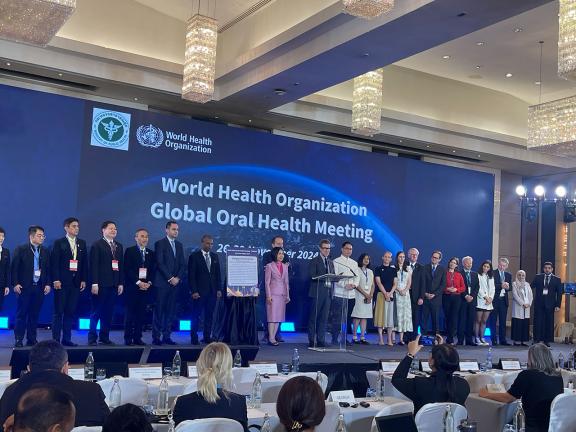WHO Members States adopt the Bangkok Declaration - A milestone for global oral health

The World Health Organization (WHO) organized its first-ever Global Oral Health Meeting in collaboration with the Government of Thailand in Bangkok, Thailand, from 26 to 29 November 2024, bringing together global health leaders to address critical oral health issues. FDI was prominently represented at the event, with Dr Greg Chadwick, FDI's President, attending in person.
At the meeting, WHO Member States adopted the “Bangkok Declaration – No Health Without Oral Health: Towards Universal Health Coverage for Oral Health by 2030”. This meeting represents a major milestone in preparing for the 4th UN High-Level Meeting (UN HLM) on Noncommunicable Diseases (NCDs) planned for September 2025.
Global gathering for a shared vision
The three-and-a-half-day meeting brought together participants from the six WHO regions, including representatives from over 100 countries, selected United Nations agencies, civil society organizations, philanthropies, and the private sector. The WHO Regional Directors for Southeast Asia and the Western Pacific Regions, as well as several health ministers, participated in person.
Building on the WHA Resolution on Oral Health
The meeting builds on efforts to implement the landmark World Health Assembly (WHA) Resolution on Oral Health adopted in May 2021. This resolution is significant for three main reasons:
- Historic commitment: It was the first global policy-level commitment to oral health since 2007.
- Integration into health systems: It recognizes oral health services as an integral component of health systems, NCD programs, and Universal Health Coverage (UHC) benefit packages.
- Action-oriented goals: It mandates WHO and Member States to develop a Global Strategy on Oral Health by 2022, translate it into an actionable plan with measurable targets by 2023, and monitor progress through comprehensive reports starting in 2024.
Through the WHO Global Oral Health Action Plan (2023 – 2030) published in 2023, Member States also tasked the WHO Secretariat with convening a global meeting on oral health, laying the groundwork for this historic gathering in Bangkok.
Format, highlights and outcomes
Over the first three days, participants shared insights and experiences on advancing the six strategic objectives of the Global Strategy on Oral Health:
- Oral health governance
- Oral health promotion and disease prevention
- Health workforce
- Oral health care
- Oral health information systems
- Oral health research agendas
Attendees also discussed the potential establishment of a WHO-hosted Global Coalition on Oral Health to accelerate the implementation of the Global Oral Health Action Plan (GOHAP).
The final day featured a high-level segment, with a keynote address from Dr Saia Ma`u Piukala, Director of WHO’s Western Pacific Regional Organization and a vocal oral health advocate. Ministers of Health from various countries also reaffirmed their commitment to integrating oral health into national NCD and UHC strategies.
Representatives from UN agencies, civil society, and private sector organizations, including FDI, International Association for Dental, Oral, and Craniofacial Research (IADR), Global Self-Care Federation (GSCF), and others, also contributed to a multistakeholder dialogue on the last day. They underscored the importance of multistakeholder collaboration in accelerating GOHAP implementation and outlined potential roles their organizations could play in this effort.
Promoting FDI's perspectives through side events
FDI was involved in a series of side events during the meeting in Bangkok.
The FDI President spoke at a side event titled “Expanding the NCD framework: Integrating oral diseases and sugar into the 6x6 Approach”, which focused on the opportunity to elevate oral health within the NCD framework by prioritizing oral disease as a major NCD and sugar as a major stand-alone risk factor.
FDI also co-hosted a side-event titled “Promoting sugar reduction policies” with the WHO Collaborating Centre on Oral health Inequalities and Public Health, University College London, the Thai Health Promotion Foundation and the Sweet Enough Network, Thailand. Speakers included the FDI President, and Chief Dental Officers of Greece and Malaysia as well as the Director, Thai Health Promotion Foundation.
Furthermore, FDI also hosted a side-event “Tackling antimicrobial resistance through oral health: a global priority”, and the speakers included Dr Wendy Thompson, Chair, Preventing AMR and Infections Task Team, FDI, the Chief Dental Officer of Norway, a representative of the Ministry of Health, Thailand and the WHO Thailand Focal Point for AMR.
The Bangkok Declaration: A Call to Action
Adopting the Bangkok Declaration represents a watershed moment for the oral health community. The Declaration acknowledges:
- an urgent need to address the growing burden of oral diseases through national roadmaps aligned with GOHAP.
- the importance of integrating oral health within UHC and NCD frameworks.
- the critical role of addressing sugars in reducing dental caries and other NCDs.
- industry interference in health policies as a recognized barrier to effective NCD responses.
Additionally, the Declaration calls for integrating 3 of the 11 global targets on oral health in the next version of the Global Monitoring Framework for NCDs. It also recommends including oral diseases and public health measures for their prevention and management in the Political Declaration of the 4th UN HLM.
A Starting Point for Advocacy
While the Global Oral Health Meeting has concluded, it marks the start of advocacy efforts by the oral health community, leading to the 2025 UN HLM on NCDs. The Bangkok Declaration’s clear call to action underscores the need for sustained commitment and collaboration to recognize oral health as a fundamental component of global health. FDI stands ready to work with all relevant stakeholders to ensure its successful implementation.
